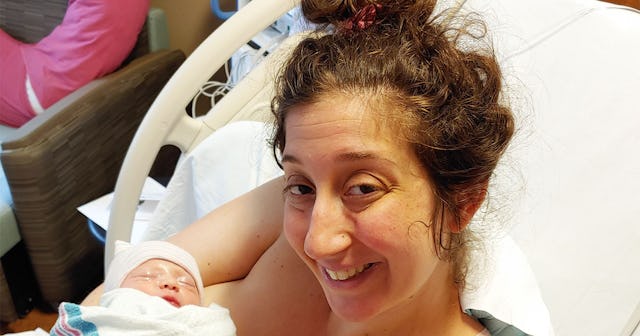If It Weren't For My Pregnancy, I Wouldn't Have Discovered My Breast Cancer

As I entered the delivery room, my eyes were immediately drawn to the scarlet letter: the red handwriting on the whiteboard outside of my room upon which was scrawled “B.C.” for breast cancer. This caused a lot of discomfort among the nursing staff, who would start lecturing me about breastfeeding before awkwardly catching their error and turning a shade of scarlet themselves, their expressions transformed into apologetic looks of pity. I hated pity. I was determined to keep breast cancer out of the birthing suite.
Only moments earlier, I had gone through the same entrance to the hospital that I used the prior week for my initial consultation with the breast surgeon. Now the nervous excitement of the families rotating in and out of the delivery rooms with their brightly colored balloons and gigantic pink and blue teddy bears filled me with envy. To me, the birth of my child had become an initial procedure in a long, arduous trek up a much steeper mountain. And then what? The future seemed so distant and so blurry. I could not see beyond the cancer.
My pregnancy had occurred “by accident” while my six-month-old son was napping. I had spent a significant part of my pregnancy beating myself up for being foolish enough to get knocked up. But, simultaneously, something about the serendipity of the pregnancy pleased me; reminding me that life could not be planned and some things were besheret (meant to be), as my grandmother would have said. Josh and I jokingly nicknamed the fetus “J.C.” because it certainly seemed to us that this was an immaculate conception.
Courtesy of Jenny Leon
When my first child was born, my neurotic obsession with his health threatened to jeopardize my own. I slept with the light on, so I could monitor his breathing. Josh knew that I needed to sleep, but I did not. I kept thinking, “I can survive this. I am strong. My baby is vulnerable and weak. It is my job to protect him.”
The stakes were so different now. My agency over this pregnancy, my birth experience, and my body had been stripped by my diagnosis. Not only was I being forced to deliver my daughter three weeks early so that I could undergo a double mastectomy on her original due date, I also had to rest in order to protect myself, so I could be there for my children in the future. No concept was more foreign to me. I did not know how to be a mother (or anything else for that matter) without going at it with all my might — to me, that was the definition of what it meant to be a good mother.
It was time to push. As I struggled to contain my matted curls in a scrunchie on top of my head, I could not stop thinking about losing my hair. I had inherited my hair from my father, who, in turn, had inherited his hair from his mother. It turns out hair was not the only strong gene that was passed along our Ashkenazi genetic line. Along with thick, beautiful hair and thick, beautiful thighs, the BRCA1 gene had been passed down from generation to generation, unbeknownst to any of us. But the gene was no longer invisible. I may have passed this gene onto my toddler and the life growing inside of me. How strange it was that two things so different could be growing in my body at the same time: fertility and malignancy.
Courtesy of Jenny Leon
I had wavered on whether I wanted to find out the sex of the baby, especially since receiving my diagnosis, but Josh would not let me budge. He knew I needed a good surprise. As the baby began to crown, I was sure it was another boy.
And then with one big, groaning push, SHE was here. The perfect daughter I had always wanted.
She appeared small at a mere six pounds, whereas my son had weighed almost eight and a half pounds at birth. I could not look at her E.T.-like feet because they reminded me that she may have liked to stay in the warm comfort of the womb for another couple of weeks.
But she was beautiful. Everyone said that with her rose petal lips, dark skin and full head of hair, she looked just like her mother.
More significantly, she was mighty. She had defied the odds surrounding conception, she pushed herself easily into this world and she had literally saved my life (as I do not think I would have sought medical attention so quickly for the tiny, insignificant-feeling hardness in my breast had I not been going to regularly scheduled OB appointments).
It was not that she made me forget that I had cancer. I do not think that is possible. But she did make me realize that there could be great joy even with cancer. Perhaps the joy was heightened because we all needed some joy. At that moment, I felt that my life would no longer be what I expected, but it just might be okay. After all, our daughter was unexpected and she was besheret.
We named her Lyla after my grandmother’s sister who died of breast cancer. In Hebrew, Lyla means night. Her Hebrew name is Orli, which means light. She would be our light in the night. She would get us through.
This article was originally published on